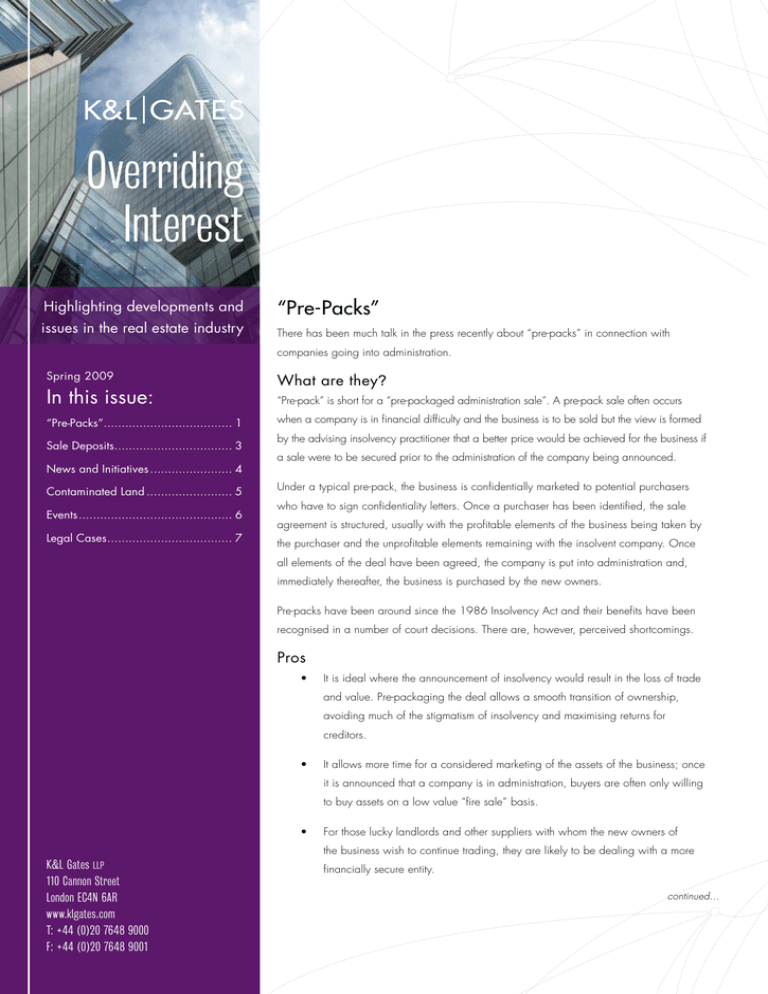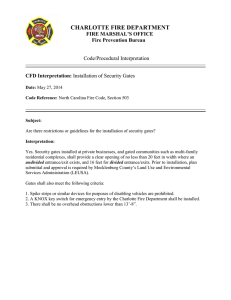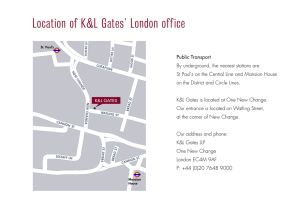
Overriding
Interest
Highlighting developments and
issues in the real estate industry
“Pre-Packs”
There has been much talk in the press recently about “pre-packs” in connection with
companies going into administration.
Spring 2009
In this issue:
“Pre-Packs”..................................... 1
Sale Deposits.................................. 3
News and Initiatives........................ 4
Contaminated Land......................... 5
Events............................................ 6
Legal Cases.................................... 7
What are they?
“Pre-pack” is short for a “pre-packaged administration sale”. A pre-pack sale often occurs
when a company is in financial difficulty and the business is to be sold but the view is formed
by the advising insolvency practitioner that a better price would be achieved for the business if
a sale were to be secured prior to the administration of the company being announced.
Under a typical pre-pack, the business is confidentially marketed to potential purchasers
who have to sign confidentiality letters. Once a purchaser has been identified, the sale
agreement is structured, usually with the profitable elements of the business being taken by
the purchaser and the unprofitable elements remaining with the insolvent company. Once
all elements of the deal have been agreed, the company is put into administration and,
immediately thereafter, the business is purchased by the new owners.
Pre-packs have been around since the 1986 Insolvency Act and their benefits have been
recognised in a number of court decisions. There are, however, perceived shortcomings.
Pros
•
It is ideal where the announcement of insolvency would result in the loss of trade
and value. Pre-packaging the deal allows a smooth transition of ownership,
avoiding much of the stigmatism of insolvency and maximising returns for
creditors.
•
It allows more time for a considered marketing of the assets of the business; once
it is announced that a company is in administration, buyers are often only willing
to buy assets on a low value “fire sale” basis.
•
For those lucky landlords and other suppliers with whom the new owners of
the business wish to continue trading, they are likely to be dealing with a more
K&L Gates LLP
110 Cannon Street
London EC4N 6AR
www.klgates.com
T: +44 (0)20 7648 9000
F: +44 (0)20 7648 9001
financially secure entity.
continued...
continued from page one
Cons
New guidance
connection between the purchaser and the
On 1 January 2009, the Association of
directors or shareholders of the insolvent
transparency about the whole
Business Recovery Professionals (ABRP)
company, and details of all the assets
process. Compared with transactions
produced a Statement of Insolvency Practice
involved in the transaction.
undertaken during an administration or
in relation to pre-packs. The Statement arose
other insolvency process, the creditors
out of concerns over the growing use of
Conclusion
have much less prior information and,
pre-packs and public criticism of them. The
indeed, are handed a fait accomplis
Statement does not make any changes to
on the day that the company goes into
the law but simply seeks to guide insolvency
administration under a pre-pack.
practitioners in their use of pre-packs.
• There is a perceived lack of
• There can be suspicions as to whether
best value has been obtained,
particularly if the business is sold to
the existing management who have
formed a “phoenix” company to
continue to run the business but without
many of the previous liabilities.
• Those unlucky landlords whose
properties are not required by the
business and those suppliers who
cannot exert any “ransom” commercial
leverage will find themselves as
simply one of the unsecured creditors
who recover little or nothing from an
eventual liquidation of the insolvent
company.
• Landlords whose properties are
clear about their role, which is as advisers
to the company and not to the directors
and that they should seek to perform their
required by the new business may
functions in the interests of the company’s
suddenly be told that their property
creditors as a whole.
is occupied by a new entity without
their consent and may find their
options for objecting to the new
occupier to be limited.
2
The Statement advises practitioners to be
Overriding Interest
The Statement sets out a long list of items to
be disclosed to creditors after the pre-pack
sale has taken place, including marketing
conducted, valuations obtained, any
The ABRP Statement may help allay some of
the public concern about the use of prepacks but, ultimately, those left out of pocket
by an insolvency are unlikely to be content
regardless of the procedures adopted.
Sale Deposits
In the current market, many buyers are
can be forfeited if the buyer fails to
Conclusion
walking away from unprofitable deals. The
complete. A seller will be permitted to
Buyers who walk away from their deals
question of whether they can recover their
forfeit even if it achieves a subsequent
are very unlikely to be able to recover their
deposit often arises.
sale at a higher price than the original
deposits and if they have made no attempt
buyer agreed to pay.
to discuss alternatives with the sellers they
Following on from the decision in Aribisla
No. 1, which OI readers may recall from
3.However, deposits in excess of 10%
2007, the Court has again had cause to
may be struck down as a penalty.
look at the issue of land sale deposits. This
time, it has looked at the question of the
exercise of its discretion under section 49(2)
of the Law of Property Act 1925 to grant
relief from forfeiture of a deposit where a
purchaser has defaulted.
The Court of Appeal in Midill (97PL) - v Park Lane Estates (2008) usefully reviewed
the general law relating to land sale
deposits and the following points emerge:
1.A t common law, a contractual
penalty for default, i.e. one that
does not represent a genuine preestimate of loss likely to flow from a
breach, can be struck down by the
Court as being invalid.
2.However, land sale deposits at or
below the usual level of 10% are an
established exception to the ordinary
principles governing contract penalties.
Such a deposit is an earnest for the
performance of the contract and
have virtually no prospect of doing so.
4.With regards to section 49(2), the
starting point (where the deposit is no
more than the customary 10%) is that
relief should not be granted to the buyer.
5. In order to succeed in its application
for relief, a buyer would have to
show more than that the seller
suffered no loss.
As regard the matters that the Court could
take into account when considering whether
or not to grant relief under section 49(2),
little further guidance is given in Midill but,
in Aribisla No. 2 (2008), it was said that
the Court could look at factors such as:
• How close the buyer came to
performing the contract;
• What alternatives he was able to
propose to the seller; and
• How advantageous the alternatives
would have been compared
with actual performance of the
contractual terms.
Spring 2009
3
News and Initiatives
UK and German Distressed
Real Estate
We recognise that many clients dealing
with distressed real estate assets and
Real Estate Global Platform
Increases
loans will face a number of legal issues
Contact Partners: Andrew Petersen, Liz Shell,
Ed Smith and Georg Foerstner
In a response to the current economic
climate, K&L Gates has set up a UK and
German distressed real estate group
which is a key part of an integrated,
interdisciplinary, multi-office practice team.
they are not accustomed to addressing,
including tax issues, environmental issues,
and employment concerns; issues related
to protecting intangible assets, such as
intellectual property and e-commerce
operations; litigation ensuing from tenant
or contractor agreements; and corporate
issues related to special purpose entities. In
The team focuses on the representation of
addressing these issues, the group brings an
investors who own or desire to acquire
experienced, business-oriented approach
distressed real estate and real estate loans
to analysing the special issues arising from
as well as Insolvency Practitioners who
troubled real estate loans and collateral
wish to sell, and institutional real estate
and to proposing specific solutions to best
lenders holding troubled real estate loans
address our clients’ needs.
and mortgage-backed securities. The
group assists lenders, special servicers
and their asset management firms with the
restructuring of distressed real estate loans
and the positioning of repossessed assets for
successful sales.
4
Overriding Interest
The firm has recently established its second
office in Germany, with the opening of
a Frankfurt location, which includes the
addition of partners Dr. Mathias Schulze
Steinen and Dr. Frank Thomas. The move
comes two years after the launch of K&L
Gates’ German practice in Berlin and
boosts the total number of the firm’s German
lawyers to 40 across two offices.
In addition, the combination with Chicagobased Bell, Boyd & Lloyd LLP (Bell Boyd)
became effective on March 1 2009,
following unanimous approval from partners
of both firms on January 30, 2009. This
means that the combined firm comprises
approximately 1,900 lawyers in 32 offices
throughout the United States, Europe,
and Asia.
Contaminated Land
The Environment Agency has published
• The remediation of most
a review of progress in dealing with
contaminated land sites starts more
contaminated land in England and Wales.
than 1 year after the site has been
The report covers the period 2000 to 31
determined and the time it takes
March 2007 using information collected
to remediate the sites can range
from Local Authorities and the Agency’s own
considerably between a number of
information on special sites.
months to many years.
The full report is available from www.
• Where sites have been remediated,
environment-agency.gov.uk. The main
this is mainly been through excavation
conclusions are as follows:
and off-site disposal of material.
• There could be in the region of
• The most common types of activity
300,000 hectares of potentially
that may have caused contamination
contaminated sites. The major route
are the energy industry and the waste
for dealing with land contamination is
management industry, with the metal
the planning system and the majority
industry and the timber processing
of sites are managed in this way.
industry also being significant.
• By the end of March 2007, a total
• It was possible to recover the
of 781 sites had been identified as
costs of remediating 69 sites but
being contaminated. The majority of
that cost recovery had only started
these sites were in housing areas,
for 17 sites. Cost recovery had
many of which form part of larger
been completed for only 5 sites by
group of properties. Of these 781
March 2007. Although appropriate
sites, 35 are designated special sites.
persons had been identified for
Of the 746 non-special sites, local
350 sites, they are only likely to
authorities reported that 144 had
pay to remediate 86 sites. There is
been completely remediated. Of the
therefore a significant public cost
special sites, 5 had been remediated.
associated with the remediation of
contaminated land.
Spring 2009
5
Events
We will be running a series of banking and real estate seminars in May.
The first event is on 6 May which will be an evening Q&A event following
last December’s launch of “Real Estate Finance: Law, Regulation and Practice”
(LexisNexis Butterworths 2008). Speakers will include Trevor Williams, Chief
Economists, Lloyds TSB Corporate Markets.
The remaining events will be breakfast seminars and will address a number of
current topics, such as reviewing lenders’ security and questions of enforcement.
Please look out for your invitations which will be e-mailed out shortly.
We also regularly provide bespoke in-house training free of charge to clients. If that is something that would interest you,
please feel free to get in touch.
6
Overriding Interest
Legal Cases
Rent Reviews
Break Clauses
Service Charges
On a rent review of the headlease of a multi-
A lease provided that a tenant’s break notice
The Articles of Association of the
occupied block, the Arbitrator rejected the
would be effective either if it was served in
management company of a block required
tenant’s valuation submissions and accepted
accordance with its terms or else if receipt
its members (who were also lessees in the
the landlord’s case that the new rent should
was acknowledged by the landlord. Notice
block) to contribute towards a “recovery
be the total rental income achievable from
was served but not in accordance with the
fund”. One of the member/lessees objected
sublettings. The Court held that the Arbitrator
terms of the lease and receipt was only
that the contribution was an unlawful service
had erred in not making a deduction for a
acknowledged by the landlord some months
charge to which he said section 18 of the
profit element expected to be taken by the
after the break date. The Court held that the
Landlord and Tenant Act 1985 applied.
hypothetical tenant.
notice was ineffective.
It was held that the contribution was not
Comment: There was said to have been a
Comment: It was said that acknowledgement
serious irregularity and the case was remitted
had to take place before the break date.
back to the Arbitrator under section 68 of the
Arbitration Act for his reconsideration.
Metropolitan Property Realisations - v Atmore Investments, Ch D
Orchard (Developments) Holdings - v Reuters, CA
Easements
a service charge and section 18 had no
application.
Comment: A distinction was made between
liabilities as members under the Articles and
those as lessees under the leases.
Morshead Mansions - v - Di Marco, CA
Alienation
Where a landowner had granted a right
A tenant executed a “virtual assignment” of a
use a loading bay and third parties of the
Where a landowner had previously agreed
lease under which all the economic benefits
neighbour’s tenants, without the consent or
to permit a neighbouring landowner to
and burdens were transferred to a third party
encouragement of the neighbour, used the
proceed with a specific development project
without assigning the lease but without the
loading bay in breach of the landowner’s
that infringed its right of light, that agreement
consent of the landlord. It was held that
conditions, the landowner’s application for
did not bring about a total extinguishment
there had been a breach of the covenant
an injunction against the neighbour failed.
of the landowner’s right of light such that a
not to part with or share occupation of the
premises.
Comment: The virtual assignment was said
not to have breached the covenant not to
assign or execute a declaration of trust.
(subject to conditions) to a neighbour to
Comment: The landowner could not establish
that it was the neighbour who was acting
unlawfully, rather than the third parties.
Trustees Limited - v - Papakyriacou, QBD
Right of Light
substantially different development proposed
by the neighbour could proceed.
Comment: There was no consent within
section 3 of the Prescription Act 1832.
Salvage Wharf - v - G & S Brough, CA
Clarence House - v - National Westminster
Bank, Ch D
Spring 2009
7
For further information contact:
Steven Cox steven.cox@klgates.com Milton McIntosh milton.mcintosh@klgates.com T: +44 (0)20 7360 8259
Bonny Hedderly bonny.hedderly@klgates.com T: +44 (0)20 7360 8192
T: +44 (0)20 7360 8213
K&L Gates comprises approximately 1,900 lawyers in 32 offices located in North America, Europe and
Asia, and represents capital markets participants, entrepreneurs, growth and middle market companies,
leading FORTUNE 100 and FTSE 100 global corporations and public sector entities. For more information,
visit www.klgates.com.
K&L Gates comprises multiple affiliated partnerships: a limited liability partnership with the full name K&L Gates LLP qualified in Delaware and
maintaining offices throughout the U.S., in Berlin and Frankfurt, Germany, in Beijing (K&L Gates LLP Beijing Representative Office), in Singapore
(K&L Gates LLP Singapore Representative Office), and in Shanghai (K&L Gates LLP Shanghai Representative Office); a limited liability partnership
(also named K&L Gates LLP) incorporated in England and maintaining our London and Paris offices; a Taiwan general partnership (K&L Gates)
which practices from our Taipei office; and a Hong Kong general partnership (K&L Gates, Solicitors) which practices from our Hong Kong office.
K&L Gates maintains appropriate registrations in the jurisdictions in which its offices are located. A list of the partners in each entity is available for
inspection at any K&L Gates office.
This publication is for informational purposes and does not contain or convey legal advice. The information herein should not be used or relied
upon in regard to any particular facts or circumstances without first consulting a lawyer.
©2009 K&L Gates LLP. All Rights Reserved.





